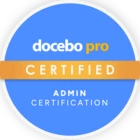Recently we’ve been receiving a lot of requests for localization of our video-based courses. We currently handle three languages, but the addition of more languages is beyond the scope of our small team. I was wondering how other admins/organizations have approached this challenge. Has anyone been able to find a contractor that can localize their courses speedily, accurately, and at a reasonable cost? Our courses are quite technical, so I’m wondering how accurate an outside contractor would be. Also, how have you handled the Docebo side of things? I know the user interface supports a wide range of languages, but how easy is it to maintain custom elements like menus and pages without a native speaker in-house?
Log in to Docebo Community
Enter your email address or username and password below to log in to Docebo Community. No account yet? Create an account
Docebo Employee Login
or
Enter your E-mail address. We'll send you an e-mail with instructions to reset your password.





